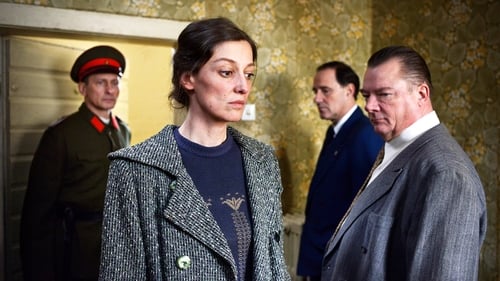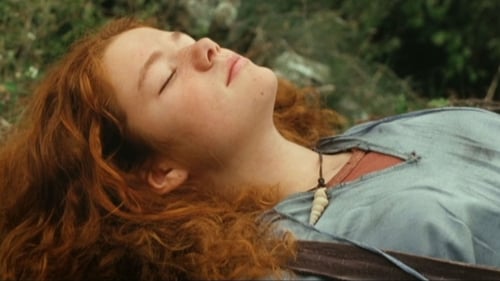
Editor
Sven Marquardt might be the most famous bouncer worldwide. But beside standing in front of the legendary techno club Berghain in Berlin, he is also a well-known and skilled photographer. Long before the Berlin Wall came down, Marquardt portrayed the subcultural East-Berlin scene. His black and white photography illustrates it as voluptuous, laid-back, dirty and existential. Even if shot by daylight, his work is permeated by darkness, ecstasy and night.

Editor
A German communist wrongly accused and sent to a labour camp has to keep her past life hidden for the sake of her and her family’s freedom.

Editor
From October 3, 1989 to October 3, 1990, filmmaker Roland Blum was commissioned by ZDF to capture how people in the GDR fared during the period of change, only to meet them again ten years later. The changes that unification with West Germany brought with it often manifested themselves in the way the environment was treated, because it was seen as the GDR's "dowry". The focus is on the Lubmin nuclear power plant, which was shut down in 1990, or natural disasters such as floods.

Editor
In this sun soaked adventure for the entire family, a group of five orphaned children form their own makeshift family while attempting to operate outside the rules of society. Though they must sometimes steal to survive, their loyalty to one another means that they will always have a brother or sister to count on.

Editor
In his documentary film, Volker Koepp portrays the picturesque Polish region of Pomerania. But although the region appears to be idyllic, its inhabitants are struggling with big problems. The villages and cities of Pomerania that traditionally live from agriculture are hit by unemployment rates of up to 75% after the meltdown of the state farms. While most of the young people leave the region, some of them take their chances and start fresh – for instance, a young couple that tries to rebuild an agricultural farm with the help of EU funding. Furthermore, older inhabitants, including a spry 90-year old retiree from the Uckermark region who grew up in Pomerania, tell stories about the region′s eventful past.

Editor
Thomas Heise, noted documentary filmmaker from the former GDR, takes a trip to France to visit his brother Andreas. His brother lives there in a rather unusual situation.

Editor
Documentary by Thomas Heise.

Editor
Documentary film by Helke Misselwitz.

Editor

Editor
Ramona lives her lonely life in Berlin working in a lipstick factory. One day she accidentally runs into Andrzei, a Polish mechanic illegally selling cigarettes in Germany during the weekend. One thing leads to another, and soon she finds herself pregnant. Then her life starts falling apart, when Andrzei tells her he already has a wife back in Poland and her baby dies shortly after its premature birth.

Editor
Documentary film by Helke Misselwitz.

Editor
In the little town of Herzsprung - whose name harks back to an ancient legend of broken hearts - almost nothing has changed since German unification, except a rise in unemployment. Johanna, a young mother and widow, becomes one of the unemployed and lives on welfare. To make matters worse, she falls in love with a dark-skinned, roving adventurer and the whole village starts talking about it.

Editor
In early summer 1989, Helke Misselwitz portrays young musicians in a band who produce their music on other people’s waste items. The four boys call themselves "Bulk Rubbish" and they drum out their resentment, having grown up on the new housing estates of East Berlin. A straight-up picture of the GDR youth is presented here, which in no way conforms to the official image. The film crew concentrates on the observation of the boy Enrico and his mother Erika: when the mother marries in the West, her son decides to stay in East Berlin, bidding her farewell at the border-crossing. Only shortly after, the tables are turned again: as the events in Berlin leading up to the fall of the Wall are practically captured live from the film crew, Enrico insists on maintaining his cultural identity, even after the fall of the Wall. The "Bulk Rubbish" musicians want to remain citizens of their own state and perceive the looming reunification with scepticism.

Editor
A documentary about the deconstruction of the Berlin Wall which makes no use of vocal commentary but instead focuses on visual elements. From the Potsdamer Platz to the Brandenburg Gate, the camera captures the historic events from all sides and different angles: on the one hand there are news reporters and tourists from all over the world taking pictures, children selling pieces of the wall to passers-by, and people celebrating New Year's Eve, on the other we see abandoned subway stations and officials with blank looks on their faces.

Editor
Sketches from a store cashier's everyday life.

Editor
Portrait of a private coal company in East Berlin's Prenzlauer Berg district in 1988/89. The feisty woman boss runs the business with humour and understanding. Her seven male employees respect her. To the outside world, they are all tough guys, but as they describe their jobs and personal situations, above and beyond the hard manual labour, their vulnerability starts to come to light.

Editor
A journey from the North to the South during the last year of the GDR. Laborers and puny girls, mothers, intellectuals, young and old are being interviewed about humanity, they criticize and give hope. They are strong and self confident women who have to eke out a living but still smilingly tell of a world full of contradictions. Awards: Silver Dove, Leipzig 1988.

Editor
Two men sit on the top of a roof, playing the tuba. They continually call out absurd messages making fun of official solutions and of their own slogans. The residents feel disturbed by the tuba's sound and start to attack the musicians, while they themselves keep on playing and shouting louder and louder. Finally the house is blasted and the tubas are destroyed.

Editor
The interviews conducted by Tamara Trampe in a Pankow kindergarten testify to a rare attempt to enter the world of the young interviewees completely, to give their stories a space where reality and fantasy, worries and wishes can mix freely. A space that’s not always provided in the daily life of the kindergarten, as the film casually suggests even after it was toned down by the DEFA censors: toilets without doors, ghastly birthday parties and friendly but unmistakable reprimands when the children let too much dialect slip into the grammar exercise or when their pictures of soldiers are not realistic enough.

Editor
Sitting at her typewriter, listening to tango music, she dreams. Buenos Aires and Montevideo are far away, a different world where, long ago, the tango came into being. A dream about dance and music, as well as about unfulfilled desire and wanderlust behind the Berlin Wall.

Editor
A shunter's job is to slow down, link, and unlink train wagons at a central station. The film documents - without any commentary - the working hours of few shunters at the shunting-station Dresden-Friedrichstadt, which was the largest such station in all of the former German Democratic Republic. They work day and night, amidst snow and fog at the railway tracks, speaking only as much as necessary.















